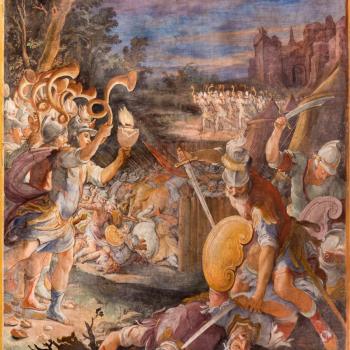In the last post I tried to answer the question of “What is Legalism?” within the context of the Christian life. In this post, I will address another common question about Christianity, namely, “What is a Christian saint?” As with the last post, I will draw from a theologian who few would regard as a saint, let alone as having lived a “saintly” life, namely, Paul Tillich. Still, even the least saintly among us can provide good definitions or strong insights into what something is, regardless of whether one succeeds in translating theory into practice. We are all morally weak, without exception, if our standard is Christ. That said, given some of Tillich’s philosophical assumptions, some modification to his doctrine is required. First, however, to his definition of what it means to be a saint.
What is a Saint?
According to Tillich, the idea of sainthood has, over time, been corrupted. The concept of sainthood and the notion of what a saint is, or should be, has been so warped that some manifestations of Christianity (mainly Protestant churches) have detached themselves completely from the entire idea:
The term ‘saint’ has been misunderstood and distorted; saintliness has been identified with religious or moral perfection. Protestantism, for these reasons, has finally removed the concept of sainthood from theology and the reality of the saint from religion.
Tillich, Systematic Theology, 121.
Those who have been at one time in their life Roman Catholic and at another time in their life Protestant, like myself, understand that one of the most noticeable differences between the two traditions is the (almost) utter lack of saints in the one and the abundance of them in the other. “The cult of the saints,” as it is commonly referred to in Roman Christianity, is, by and large, an unknown concept in most Evangelical churches in America. Even Evangelical scholars rarely refer to past heroes of the faith as “St.” so-and-so; usually referring to them simply by their historical nomenclature: like “Anselm” “Aquinas” or “Augustine.” More modern folks in the Protestant tradition are also just called by their simple, Christian name: “Eric Liddell” or “Mary Slessor.” This is, of course, not universally the case in Protestantism, as any Anglican will immediately contend.
Because of this it seems not only odd, but perhaps even unbiblical, to many Protestants when Roman Catholics or Eastern Orthodox believers refer to, or pray to, the saints. Even more strange may be when very contemporary persons, potential “saints,” are under consideration for canonization by institutions like the Vatican. One interesting example of this is going on right now in the case of Carlo Acutis, possibly the first saint of the “millennial” generation. However, the point of this article is not to denounce the cult of sainthood as construed by the Roman Catholic or Eastern Orthodox churches. I will save that for another time. Here I only want to elucidate what a saint is, both biblically and theologically (not that there is any difference between the two, one being a mere filling out of the other).
Tillich continues, then, providing the beginning of a better definition of sainthood than someone who has attained religious or moral perfection:
Saints are persons who are transparent for the ground of being which is revealed through them and who are able to enter a revelatory constellation as mediums. Their being can become a sign-event for others.
Tillich, 121
This needs some unpacking, lest anyone get too upset about Tillich’s very modernist, theological language. First, we need to translate Tillich’s concept of “the ground of being.” This is his abstract, philosophical term for what all common-sense people call God. Second, we need to clarify what he means by “a revelatory constellation as mediums.” This relates to those who can transmit or reveal something important about God to others. This “constellation” is a community: a group of God revealers. Finally, in being a vehicle for divine revelation, one can become a “sign-event” for other Christians or for non-believers: a means through which they encounter God (a “means” to encounter God, not God Himself; the Christian saint is not a new-age guru).
In simple evangelical parlance this is nothing more than “showing people Jesus” or “being the hands and feet of Christ.” Or, as Jesus himself said to his followers, “you are the light of the world” and “the salt of the earth” (Matt 5:13-16).
One can easily see that if sainthood is understood in these terms: as being transparent before God and men, as revealing something important and true about God to others, and, in so doing, becoming a kind of revelatory event in the life another believer or a nonbeliever, that moral perfection is not required for any of these to obtain. God’s revelation, not in the propositional or doctrinal sense (which is found only in the Bible), but in the personal sense, can easily come through a morally imperfect person. In fact, other than Jesus Christ, this kind of revelation of God has only come through morally imperfect people.
This is why, as Tillich points out, Protestants were right to correct the Roman Catholic view of the saint, who is not a man or woman of moral or religious perfection, some kind of Christian “superhero,” but instead, as Luther grasped profoundly, both saintly and sinful at the same time. This wipes away any distinction between the Christian “saint” and the “ordinary” Christian. There are not Christians and Christian saints, there are just Christian saints. Luther boldly pronounces this truth in one of his sermons:
I believe in one holy Christian church. We are all saints, and cursed be the one who does not boast and call himself a saint. If you believe the word of Christ, then you are just as much a saint as St. Peter and every other saint!
Luther, Sermon on Thursday after Easter (April 21, 1530)
Tillich, in more modern parlance, says essentially the same:
Protestantism does not allow a difference between the saint and the ordinary believer. Every believer is a saint in so far as he belongs to the communion of saints, the new reality which is holy in its foundation; and every saint is an ordinary believer, in so far as he belongs to those who need forgiveness of sins. On this basis, however, the believer can become a medium of revelation for others and in this sense a saint. His faith and his love can become sign-events for those who are grasped by their power and creativity.
Tillich, 122
So far so good. The true saint is not a man or woman of moral or religious perfection, but a vehicle of God’s revelation to men (again not in the propositional sense of revelation) in virtue of being part of the Body of Christ, which is the Church. There are no special Christians and ordinary Christians in that mystical Body: all who are genuinely part of it are saints. As Tillich alludes to, perhaps another term that might befit the idea of the saint is “forgiven one.”

Saints and the Law of God
Tillich, being who he was, needs to be corrected on a few points, however. And so while one can agree that to see the saint as a vehicle of revelation (again, not propositional revelation), and a medium through which the Gospel of Jesus Christ becomes transparent to others, is certainly a better way to understand sainthood than that of moral or religious perfectionism; we should nevertheless not disregard completely the idea that morality is relevant to the life of the saint or the definition of sainthood.
The reason to not dismiss moral improvement or betterment, not perfection, as evidence of sainthood is obvious: Christ himself told us that those who love Him will follow His commands:
‘If you love me, you will keep my commandments.
John 14:15
Thus, anyone who loves God will always try to follow God’s law. Moreover, to be a vehicle of God’s revelation to the world requires that one love God. Thus, the saint who is a medium of revelation (not propositional, but personal) of Jesus Christ to the world must love God, and, in virtue of loving God, will always be in the process of carrying out God’s moral law. While failures to do so happen, even quite often, the saint never dismisses, denies or rejects God’s moral law because of those failures. Instead he or she practices repentance and renewal: always striving, never fully succeeding, yet also never despairing on account of God’s loving grace.
All of this: the entire gradual, uneven and often excruciatingly difficult movement in the direction of holiness and Christ-likeness, is an indispensable reality of the Christian life. Anyone not involved in this process, known in theological terms as “sanctification,” is not a genuine believer and, as such, not a saint. Anyone who is involved in this process, however, is a saint, and there is no institution that needs to “canonize” or “beatify” the person in order for them, and others, to know as much.
















